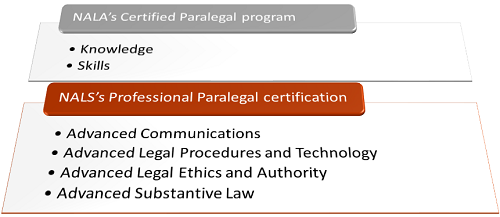There are many reasons to consider an associate’s degree in paralegal studies, but you should know what to expect from your education. Paralegal studies is one of the fastest online associates degree programs out there. This is good because it allows you to enter the workforce faster and limits the financial and time investment you have to make in preparing for your career. However, because these programs are much shorter than a four-year bachelor’s degree program – some of which may be finished in as little as 12 months – the curriculum is less extensive than you would find in a longer program of study. The coursework you take in your associate’s degree program in paralegal studies will go a long way toward preparing you for certification tests, but you may also need to prepare through independent study, practice exams, and external study methods.
Certifications and Tests for Paralegals
Although there are several different professional certifications available through local and national organizations, certification in this career path is voluntary, the United States Bureau of Labor Statistics (BLS) reported. Although states like Ohio, North Carolina and South Carolina offer their own state-specific certifications, earning these certifications isn’t mandatory to work as a paralegal in these areas. Other certifications are national in nature, recognized across the United States. National certifications include the Certified Paralegal (CP) program offered by NALA, the Paralegal Association (formerly the National Association of Legal Assistants) and the Professional Paralegal (PP) certification offered by NALS, the Association for Legal Professionals (previously known as the National Association of Legal Secretaries).
You may not need professional certification to be a paralegal, but having this certification is valuable. Some employers in the legal industry will give preference to a certified paralegal over one with no professional credentials.
The Content of National Certification Tests
For NALA’s Certified Paralegal program, candidates must complete an exam that consists of two parts, the longer Knowledge portion that consists of questions adding up to100 points and the Skills portion, which consists of 30 points. In the Knowledge section of the exam, paralegals answer questions pertaining to the United States legal system, civil litigation, contracts, corporate and commercial law, criminal law and procedure, estate planning, real estate and property, torts and the professional and ethical responsibilities of paralegals. The skills exam encompasses skills in writing, including grammar, spelling and clear expression, as well as in critical thinking, including reading comprehension, information analysis and decision making.
The exam required to attain NALS’s Professional Paralegal certification is split into four parts. In the Advanced Communications section, you will be asked questions pertaining not only to legal terminology but also to spelling, punctuation, grammar, syntax, diction, number usage and capitalization. The Advanced Legal Procedures and Technology section encompasses everything from legal research, civil procedure and citations to the skills used for electronic discovery, the use of computer information systems and the skills needed to investigate legal matters and interview witnesses and clients. In a section that emphasizes Advanced Legal Ethics and Authority, test-takers must prove their skills in analytical thinking and decision-making and their knowledge of ethical considerations and scenarios. Finally, the fourth section of the exam is focused on Advanced Substantive Law. It tests an individual’s knowledge of all areas of law, from family law to business and contract law and from civil litigation to real estate law.
In an associate’s degree program in paralegal studies, you will take coursework that covers much of these topics, including studies in legal research and writing, ethical and professional guidelines and the many different areas of law.
What to Expect From Local Paralegal Certification Tests
IMAGE SOURCE: Pixabay, public domain
Among the states that offer their own certification programs, there’s a lot of overlap between these local certification exams and the national certification exams. The biggest difference is an emphasis on topics of state law rather than the American legal system in general and federal law.
Paralegal certification under the Ohio State Bar Association, for example, requires you to pass an exam consisting of about 100 multiple-choice questions. You will have to demonstrate your knowledge of legal procedure, legal ethics and professional conduct, legal research and writing, communication, computer knowledge, law office management and your choice of two areas substantive law. In addition to your knowledge of the American legal system in general, you will be tested more specifically on your knowledge of Ohio rules of civil procedure and Ohio rules of evidence.
In North Carolina, you need to complete a three-hour exam consisting of 150 multiple-choice questions spread across five performance domains. These domains – communication, research, analysis, documentation and organization – cover core competencies and tasks. The exam also covers many areas of substantive law, including civil litigation, criminal law, family law, wills and estate planning, commercial law, real estate law and professional ethics. Again, state-specific knowledge of law is crucial to succeeding on the exam, but some knowledge of federal law and common law is also necessary. The North Carolina paralegal certification exam corresponds to the core curriculum you will find in community college paralegal studies programs in the state.
Even if you completed an associate’s degree program in paralegal studies with a great reputation and strong curriculum, you may benefit from taking an exam prep course or from following a rigorous schedule for independent study.
Additional Resources
Do Different States Have Different Rules About Becoming a Paralegal?
How Does Someone Become a Paralegal?
What Degree Do You Need to Be a Paralegal?
Does This Degree Put Me on a Strong Enough Footing to Go and Apply to Most Paralegal Positions?


